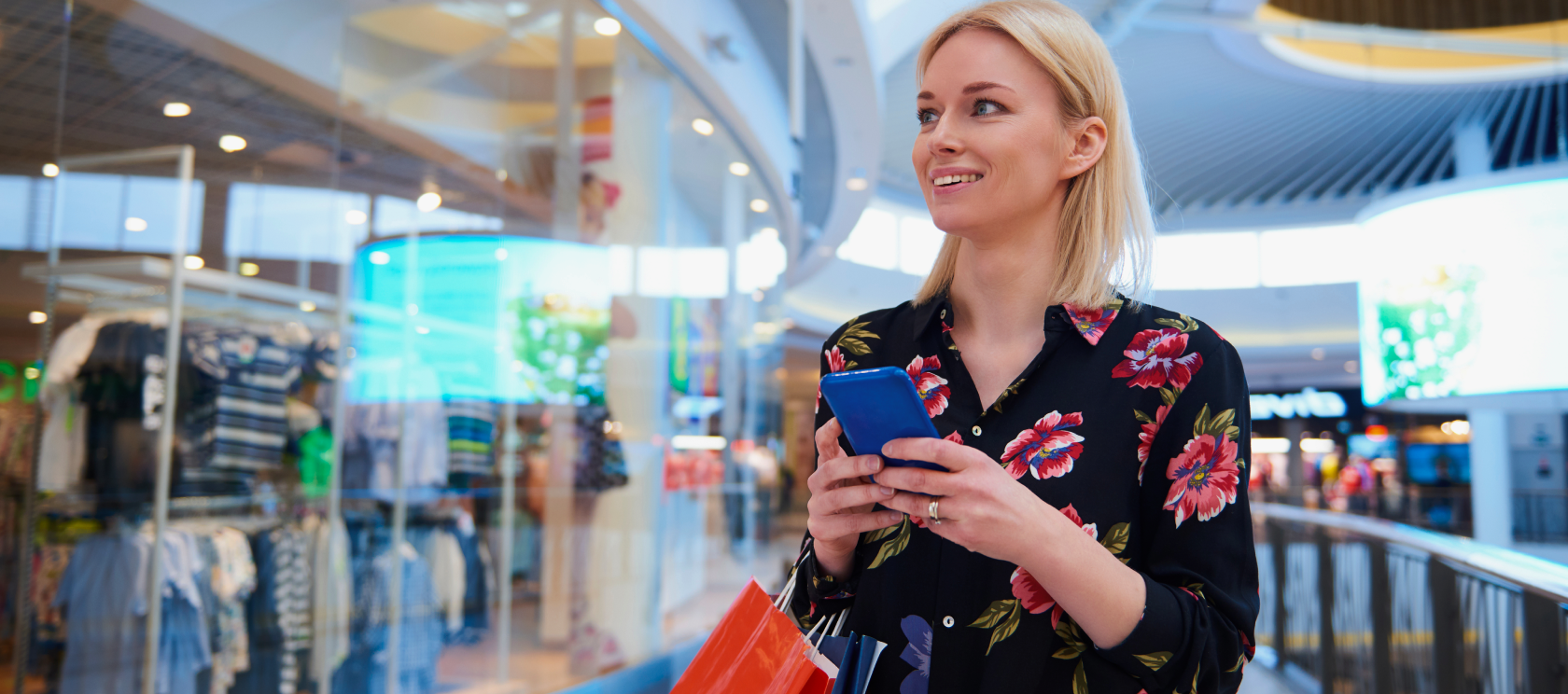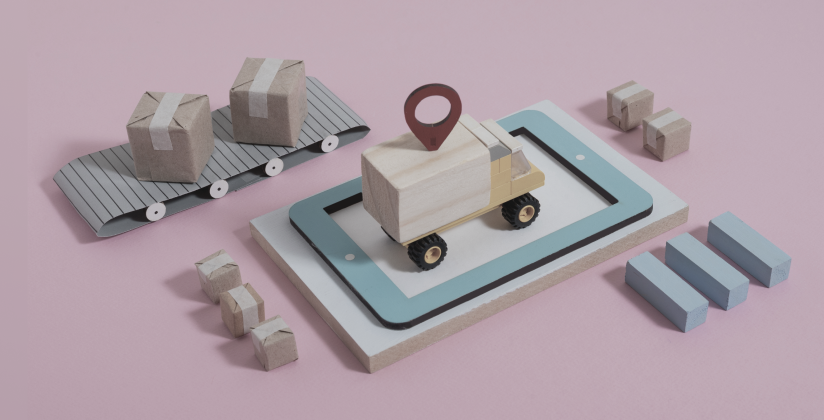Indoor navigation is like GPS for inside your mall. Just as outdoor maps help us navigate streets, indoor maps show a clear layout of your mall’s complex spaces. By offering efficient navigation tools, you can enhance the overall shopping experience for your customers, which all leads to an increase in sales and rental value of your property.
Regularly ranked among the Top Custom Software Development Companies on Clutch, our team at Volpis has spent years creating custom navigation solutions for businesses. In this article, we want to explore how indoor navigation can benefit your mall, highlight the most useful features, and share real-life examples of malls using this system.
And if you have any questions about implementing an indoor positioning system and developing a unique shopping mall app for your business, we would be happy to answer all your questions and give honest advice. You can always reach out to us via info@volpis.com with any questions.
How implementing indoor navigation in shopping malls helps to boost customer satisfaction
When visitors have a great time at your mall, they’re more likely to come back again and again. Creating positive experiences can turn shoppers into loyal customers who not only return but also recommend your mall to others. One way to improve their experience is by using indoor positioning technology.
This tech helps customers find their way around the mall, leading to happier customers, more foot traffic, and increased sales. Let’s see exactly how indoor navigation can transform the shopping experience in malls.
1. Seamless navigation: guiding to the nearest services, amenities, and stores
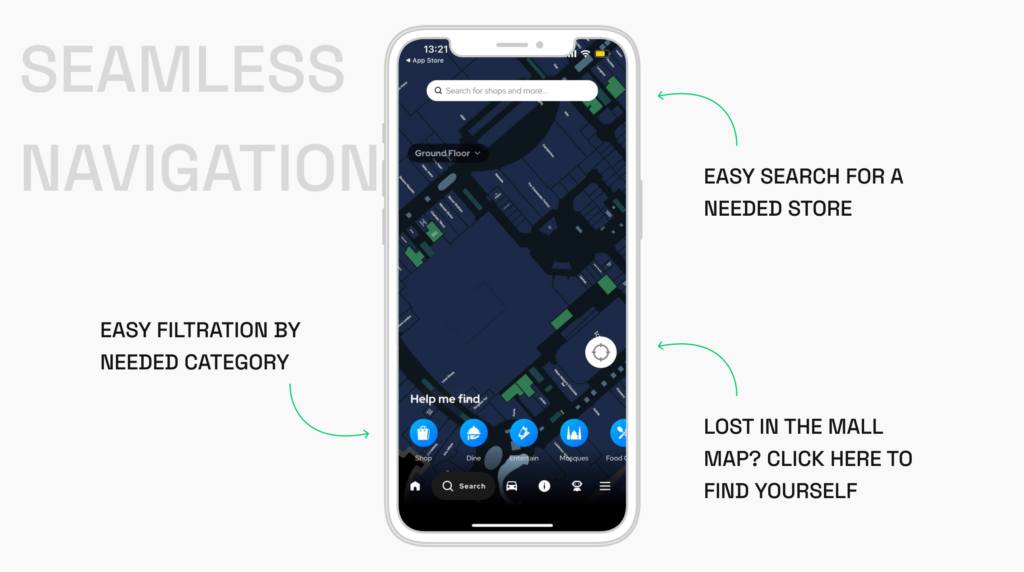
Indoor navigation makes it simple for customers to find what they need in your mall without getting lost or frustrated. Whether it’s a store, ATM, restroom, food court, or other amenities, indoor maps guide them seamlessly. This feature is especially useful in large malls where getting around can be tricky. Whether they’re new to your mall or regular shoppers, indoor maps make their journey stress-free.
Also, in a shopping center with many stores, it can be hard to discover new and interesting brands. And indoor maps solve this problem by showing different stores, highlighting what they offer, and guiding shoppers to where they want to go.
Simplifying indoor navigation can make shopping more enjoyable. When visitors can easily find stores and services, they are likely to spend more time exploring and making purchases.
2. Personalized shopping experiences & proximity marketing
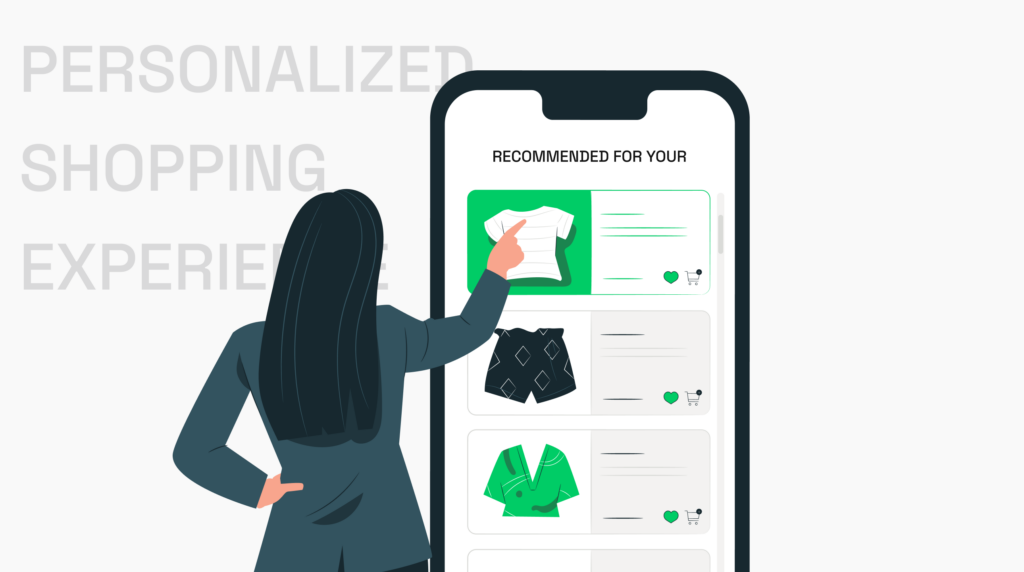
Indoor navigation systems, accessed through a simple app on their smartphones, can transform the shopping experience for your mall visitors. These systems analyze shoppers’ habits and preferences to suggest stores, promotions, and events that match their interests.
For instance, someone who often shops for electronics might receive alerts about tech store sales or directions to new gadget launches.
Indoor maps with positioning technology can be used for proximity marketing, allowing you to advertise ongoing offers and events directly to shoppers’ mobile devices as they move around the mall. This not only increases shopper interest but also drives more foot traffic to stores offering these promotions.
3. Enhanced accessibility
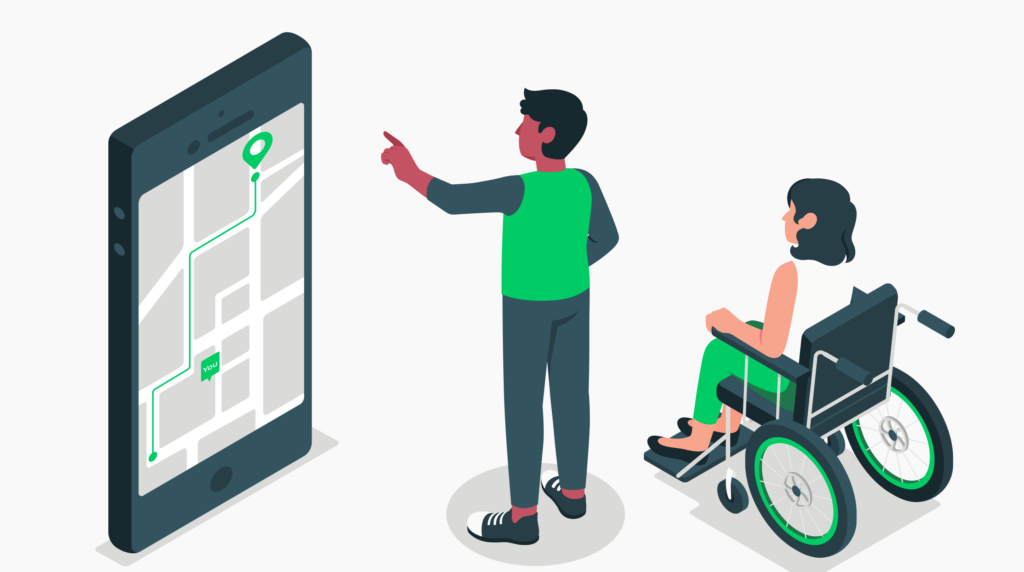
Indoor navigation systems can offer tailored routes for people with disabilities, making it simple for them to move around the mall.
Features such as voice-guided directions, wheelchair-friendly routes, and notifications about accessible facilities contribute to a more inclusive shopping environment. By addressing the needs of all customers, malls can foster a positive and welcoming atmosphere.
4. Efficient parking
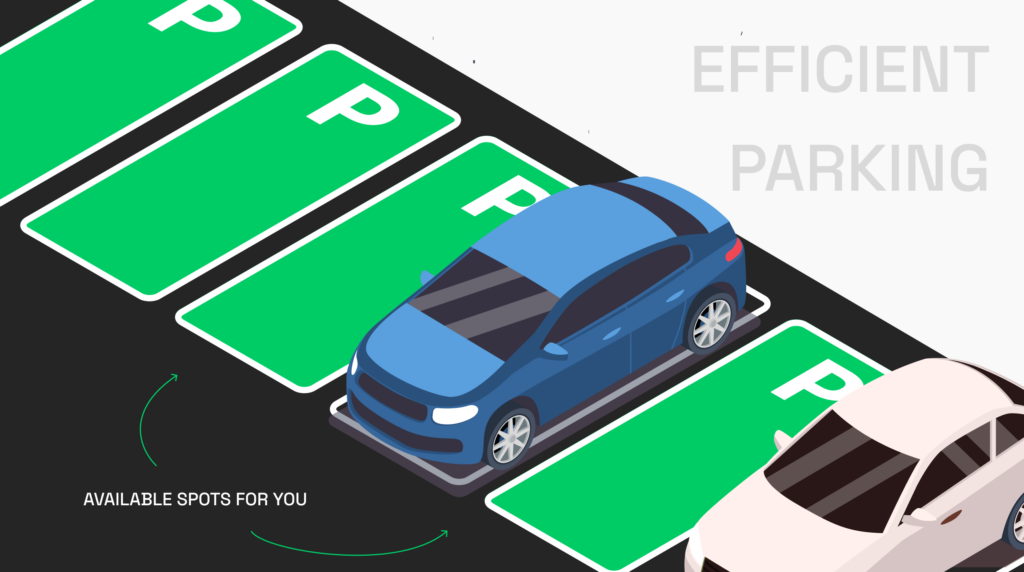
Parking is often a big concern for shoppers. And indoor navigation system can extend to parking areas. It can guide customers to available spots, provide the quickest routes back to the car, and offer reminders about parking durations.
Shopping malls often have expansive parking lots, making it hard for visitors to find their parked cars. Many shoppers forget where they parked, leading to frustrating searches. An indoor wayfinding system can alleviate this issue. By using a smartphone with a mall application, visitors can easily locate their cars on a map and receive the quickest route to them.
5. Real-time information about updates on store hours, promotions, and events
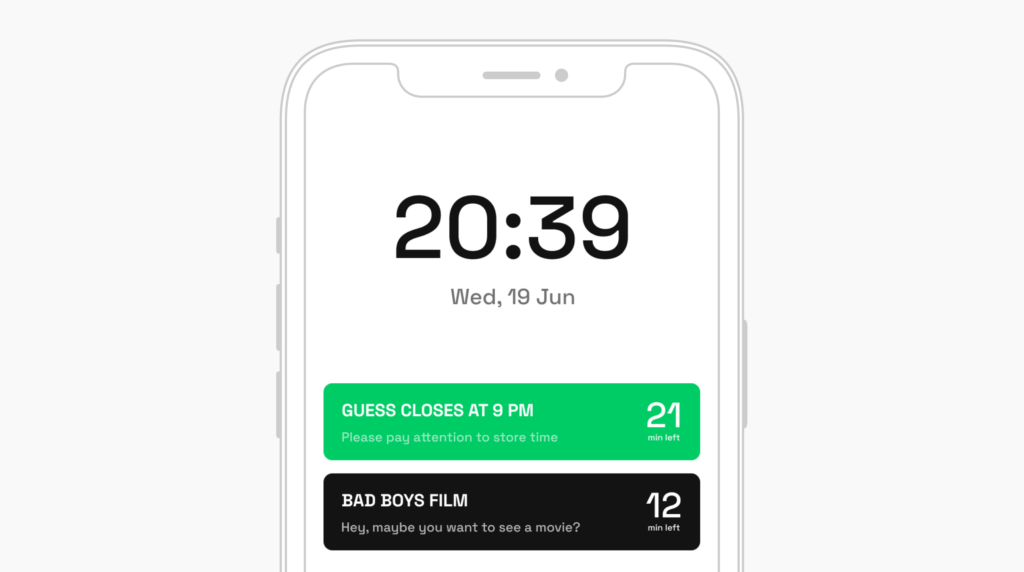
Indoor navigation systems can provide real-time updates on store hours, sales, and new products.
Also, an indoor navigation app can be useful for new stores and restaurants in a mall. They promote these new additions and guide shoppers to them.
Malls frequently host events, exhibitions, and entertainment activities. Indoor maps act as a complete guide, providing current information about ongoing and upcoming events. Visitors can easily access details about event schedules, exact location and hours, ensuring they don’t miss out on any exciting experiences.
6. Augmented reality experiences
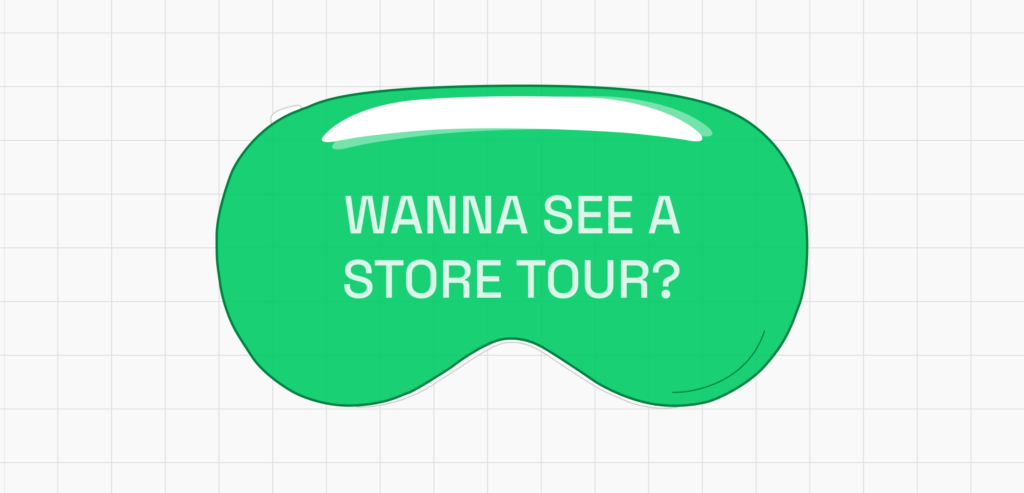
AR can offer customers virtual store tours or showcase special offers. These interactive elements can make shopping memorable and encourage customers to visit again.
7. Location sharing
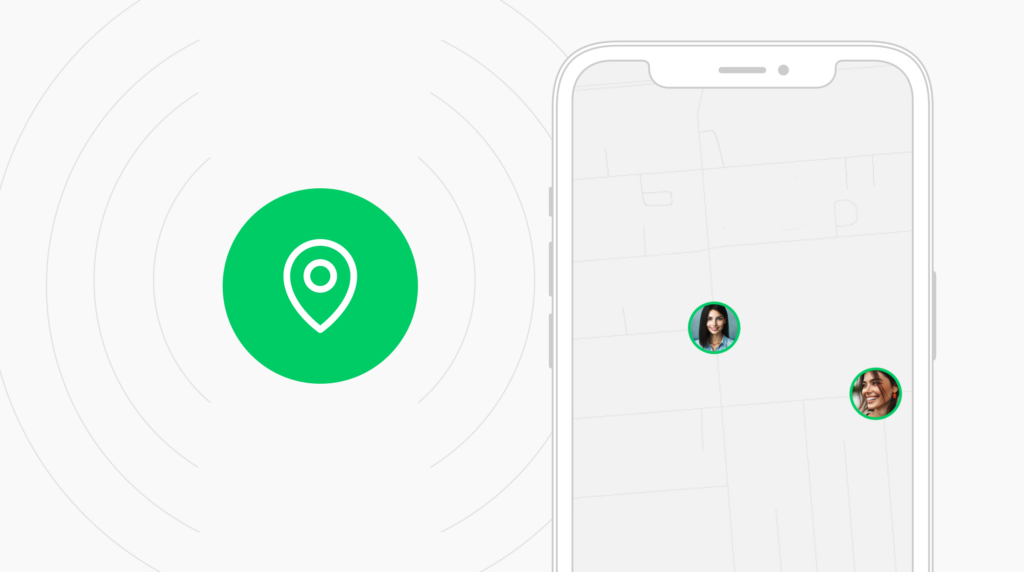
Indoor positioning app enables sharing of exact location, which can help parents keep track of their children in a mall. These technologies can be activated on a device and shared with others to receive alerts if children wander off.
Also, visitors can share their exact location with a friend or family member’s mobile device to easily find each other in a large multi-floor shopping mall.
8. Quickly searching for the desired list of products or departments on the digital map
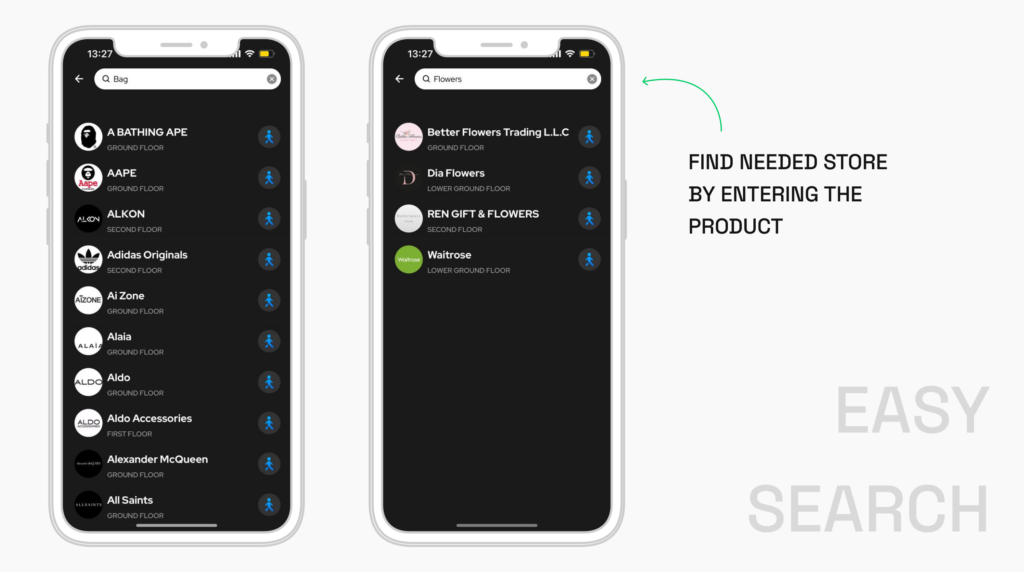
In big malls, stores can be huge and confusing, making it hard for shoppers to find what they need. Regular maps and signs often don’t cut it. That’s where an indoor positioning system for retailers can help.
With this system, shoppers can use a mobile app to easily find departments or products they’re looking for. It saves time and makes customers happier.
9. Tracking customer flows to manage lines and notify cashiers
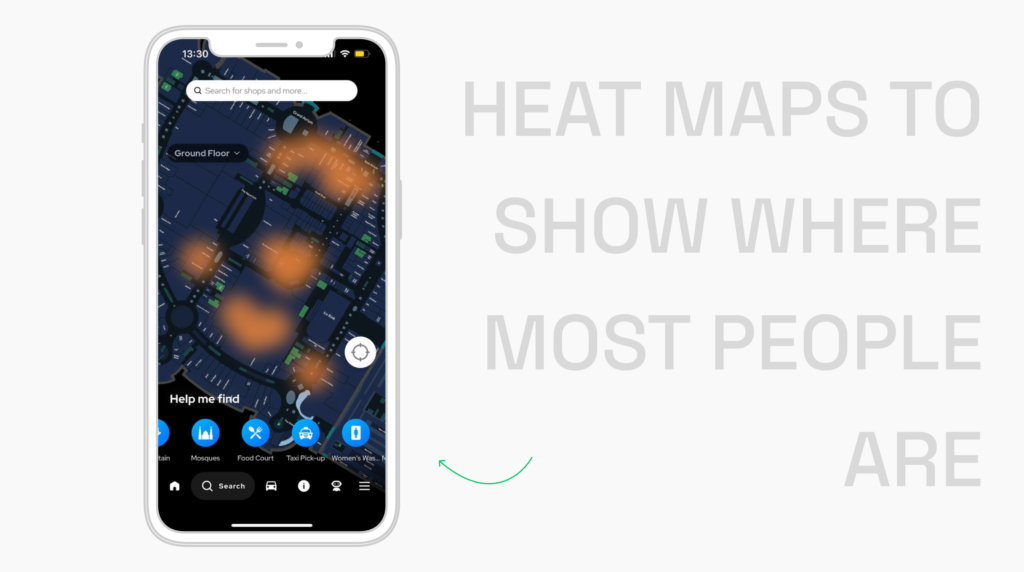
You can keep an eye on how people move around inside and organize cashiers to keep lines short.
The indoor navigation system can also make heat maps to show where most people are. With this info, managers can plan better shopping paths. It makes shopping easier for visitors and helps staff know what to do first.
10. Safety and security enhancements
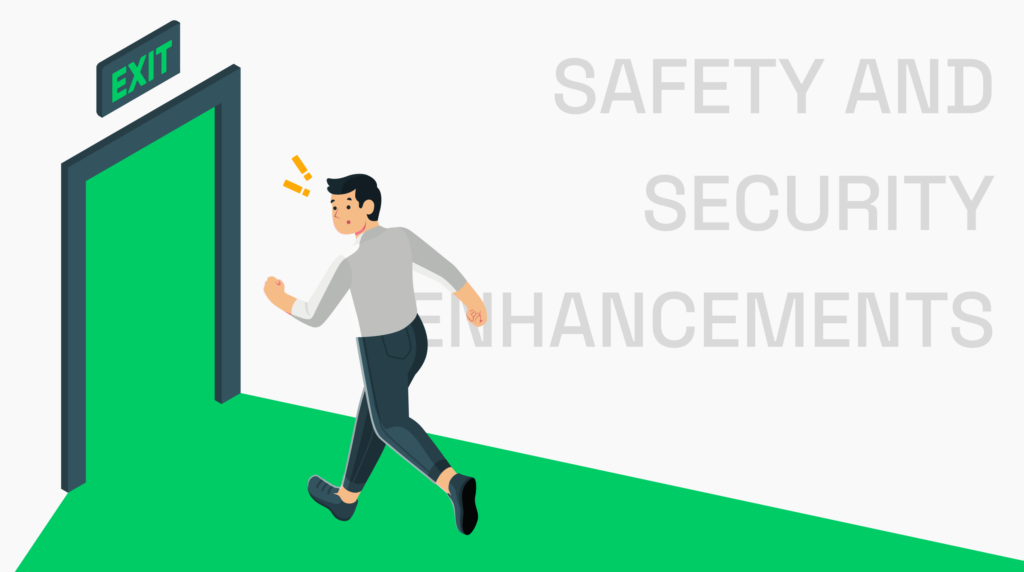
Indoor navigation systems can guide customers to the nearest exits, provide real-time updates, and help emergency services locate people quickly. These systems enhance safety, contributing to a secure shopping environment and boosting customer confidence.
Indoor maps can integrate with security systems to analyze crowd patterns and detect security breaches. This integration helps to ensure a safer environment for visitors and staff.
11. Data-driven insights for optimizing store layouts, marketing strategies, and overall mall operations
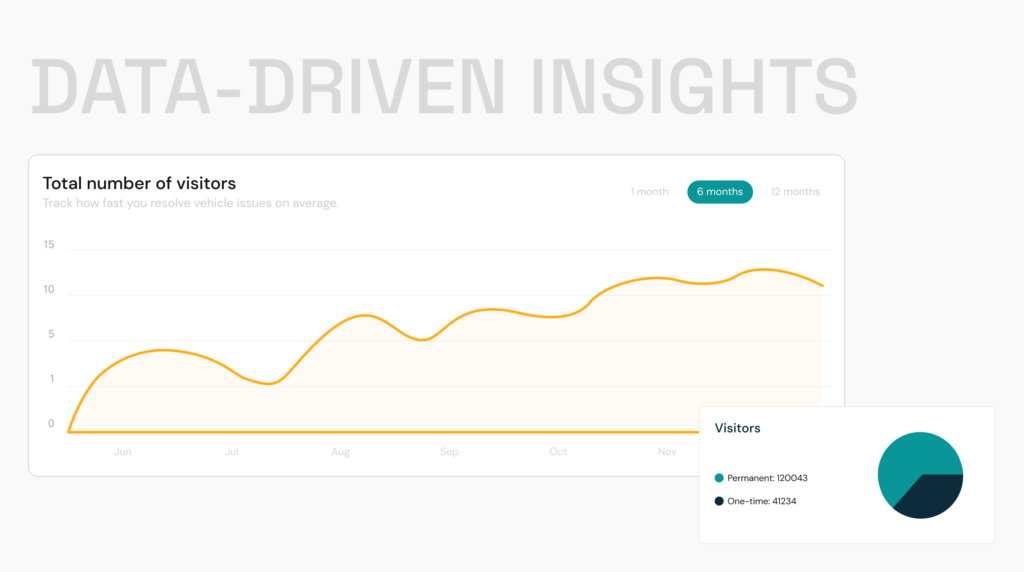
Indoor navigation systems offer valuable insights for malls and retailers. They analyze customer movement, dwell times, and popular routes to optimize store layouts and improve marketing. This helps enhance overall mall operations by drawing attention to certain areas and eliminating bottlenecks in high-traffic spots.
By tracking consumer movement and shopping patterns, malls can assess the effectiveness of their promotional events and marketing activities. Analyzing attendance in different zones helps management understand customer behavior and optimize retail space.
Indoor positioning systems provide accurate data, including visit logs, total number of visitors, frequency of visits, and wait times, as well as distinguishing between permanent and one-time customers. They also reveal the most purchased products and brands, along with the most visited spots in the store.
Also, using analytics, products can be arranged to meet the needs of each customer, enhancing their shopping experience.
12. Positioning your shopping center as an innovative space
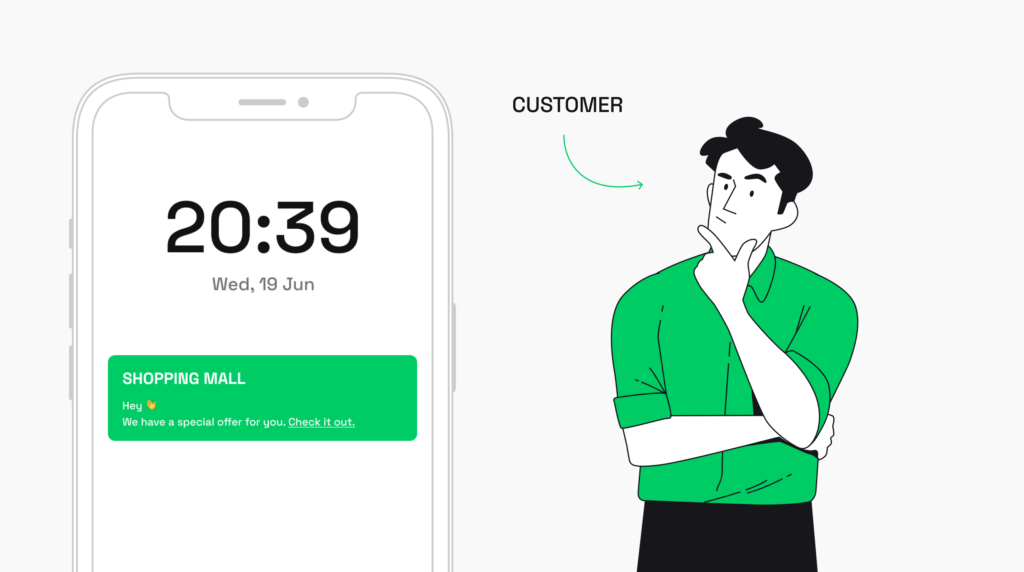
Using indoor navigation tech shows malls as innovative spots that care about customer happiness. This change not only makes shopping better but also draws more people in.
People want more than just shopping when they go to a mall. They want cool stuff like augmented reality experiences and personalized offers.
Features of indoor navigation for shopping malls
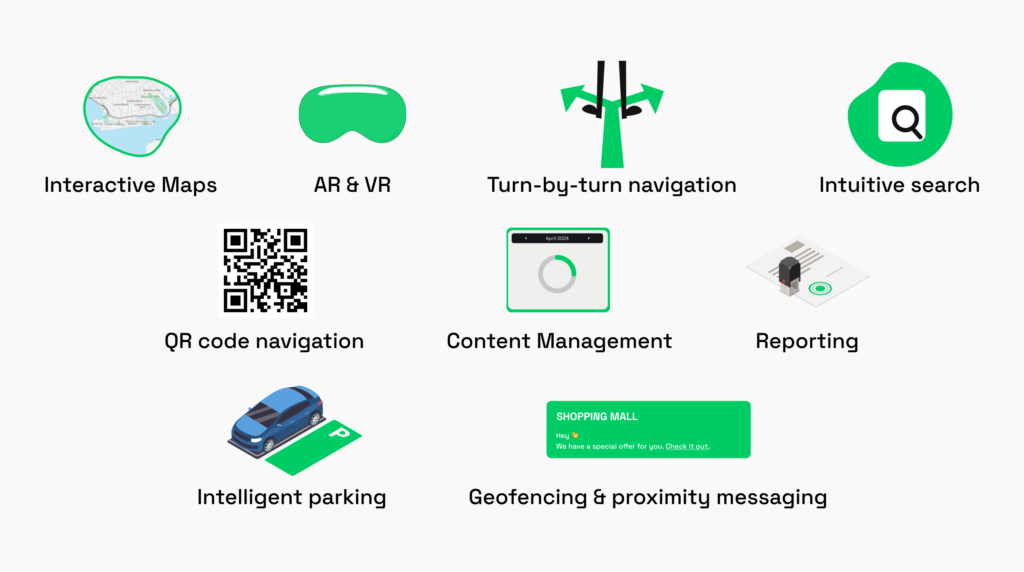
Indoor navigation in shopping malls is more than just helping your customers find their way around.
AR & VR
AR can provide shoppers with real-time directions, product information, and promotions as they navigate the mall. For example, shoppers can point their smartphones at a store and instantly see sales or product details. On the other hand, VR creates a completely immersive digital environment: it can enhance the shopping experience by allowing users to virtually explore a mall before visiting or to experience products in a virtual showroom.
Geofencing & proximity marketing
Picture getting exclusive deals when you stroll past your go-to shop. Indoor maps trigger notifications via geofencing and proximity messaging, making your shopping spree more exciting with timely and tailored offers.
Intelligent parking
Navigating crowded shopping malls to find a parking spot can be a hassle. Indoor maps can help you locate available parking spaces, making parking less stressful and ensuring you start your shopping trip smoothly.
QR code navigation
You scan a QR code when you enter a store, and it gives you a map of the mall on your phone. It tells you where to go and also sends you special offers and discounts.
Content management
Indoor maps help malls stay current by letting them quickly update info like promotions, store details, and events. Mall layout changes, like renovations or new stores, are easy to edit, keeping the maps accurate for a seamless shopping experience.
Turn-by-turn navigation & interactive maps
Turn-by-turn navigation gives your customers step-by-step directions to their destination in the mall. Indoor maps can be visually appealing and interactive. Shoppers can move them around, zoom in, and check out different stores, restaurants, and even restrooms. This means the whole mall is right there for them to explore, making their visit super easy and fun.
Intuitive search
Indoor maps help shoppers quickly find stores, services, or amenities they’re looking for, whether it’s a specific store, a restroom, or a food court. Instead of wandering around, feeling lost, shoppers can navigate the mall with confidence, knowing exactly where to go.
Reporting
Indoor maps show how shoppers behave, where they look most, the paths they take, and where they hang out. This info helps businesses tweak their plans for a happier shopping trip.
Shopping mall indoor navigation explained
But how does indoor navigation in shopping malls work?
Indoor navigation in shopping malls is like having a GPS for the indoors. It works by using digital indoor maps that help shoppers find their way around and give mall owners insights into customer preferences. These maps make it easy for shoppers to explore the mall, find stores, and locate amenities. Plus, the data they provide can help mall management understand shopper behavior better and tailor their offerings to meet their needs.
Indoor navigation services are made possible by a network of sensors installed throughout the building. These sensors work together to provide accurate location information, making navigating the mall a breeze.
There are several technologies used for shopping mall indoor navigation, like Bluetooth® Low Energy and Wi-Fi. Bluetooth® Low Energy uses iBeacon beacons placed throughout the mall to determine a customer’s location and send signals to their smartphone. Wi-Fi, on the other hand, uses existing access points and special labels to locate users through a multilateration approach.
Indoor navigation isn’t just about helping shoppers find their way. It can also be used to track assets like employees and products to reduce the risk of loss or theft. By combining these two types of indoor navigation, malls can greatly improve their KPIs and revenue.
Examples of malls using indoor location services: Dubai Mall and Mall of America
Let’s take a look at examples of businesses that use indoor location tracking tech to make customers happier.
The Dubai Mall

The Dubai Mall sees over 80 million visitors annually and covers over 12.1 million square feet, making it one of the busiest places globally. Given its vast size, indoor navigation services are a huge help for shoppers. The mall’s integrated location tracking system provides customers with wayfinding capabilities, making it much easier for them to explore and enjoy the mall’s hotels, services, and stores.
With their handy app, people can plan their visit, get turn-by-turn directions to over 1300 stores, get info about hottest trends and happenings, as well as earn rewards for all their purchases with Emirates Skywards.
Mall of America
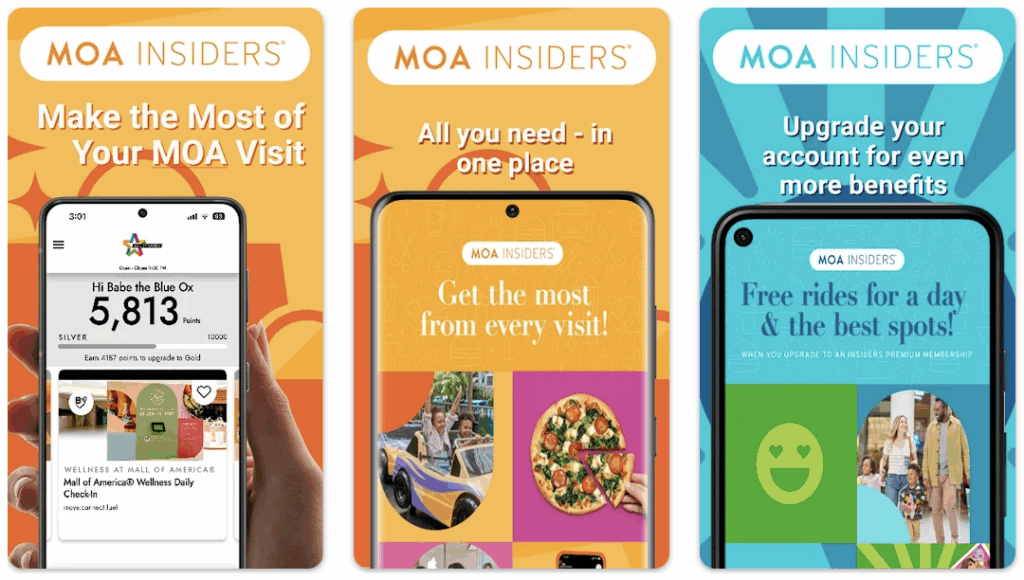
The Mall of America is massive, covering 5.6 million square feet and drawing 40 million visitors annually. It hosts over 400 events each year, including fashion shows and concerts. When it comes to shopping centers in the United States, nothing beats the size and excitement of the Mall of America.
But the Mall of America isn’t just about unique experiences and a ton of stores. It’s also big on using technology. With the MOA app, visitors can access a range of features that enhance their shopping trip. For example, the app provides real-time information on the latest deals and promotions. The app offers a mapping feature, ensuring that visitors can find their way to their desired stores and attractions without getting lost.
How we can help you implement indoor navigation in your shopping mall
Volpis team has been leveraging the power of indoor positioning technologies to assist business owners in achieving unparalleled milestones. We are proud to have received Clutch Award as one of the top user experience companies in GPS, Navigation & GIS. We would be happy to build an exceptional navigation application for your business.

Our commitment to excellence is reflected in the glowing reviews from our customers, who consistently praise our dedication to delivering exceptional results. We invite you to explore our portfolio for a detailed look at the innovative software systems we have developed for our clients.
We’d love to answer any questions you may have about shopping mall indoor navigation. You can reach out to us via info@volpis.com with any questions or to explore how we can be part of your journey.
Questions & Answers
FAQ
What is the indoor navigation system for malls?
Indoor navigation systems in malls offer guidance to visitors, as well as send targeted push notifications via apps, providing useful information or ads when a person approaches a shop.
What are the sources of customer satisfaction with shopping malls?
Factors like mall environment, promotions, service, and retailer quality influence consumer purchases.
How do you attract customers to a shopping mall?
To attract more customers, malls can focus on improving the shopping experience, offering attractive promotions, and ensuring convenience.
How can I increase traffic in my shopping mall?
To increase traffic in your shopping mall, consider implementing strategies such as hosting exciting events, offering enticing discounts, and enhancing the overall shopping experience by developing an indoor navigation app.
What is RFID in shopping malls?
RFID helps track inventory in real time by tagging each item. This improves stock visibility, allows for tracking product levels, and speeds up replenishment.
How can IoT be used in shopping malls?
IoT applications can transform your shopping mall with benefits like efficient store management, stock tracking, and monitoring, as well as improving store security and loss prevention.
How does Zara use RFID?
Zara uses UHF RFID technology embedded into garment security tags. Each tag is associated with a garment and reused about 10 times before recycling, helping with inventory management.
How is AI used in shopping malls?
AI helps retailers forecast demand, make pricing decisions, and optimize product placement, ensuring customers find the right products at the right time.
How does indoor navigation benefit shoppers in malls?
Indoor navigation benefits shoppers by helping them find stores, products, and amenities quickly.
How does indoor navigation benefit mall owners?
Mall owners benefit from indoor mapping through increased foot traffic and the ability to provide targeted promotions.
How does indoor navigation enhance the shopping mall experience during peak seasons?
During peak seasons, indoor navigation reduces congestion, helps find available parking, and streamlines the shopping process.
